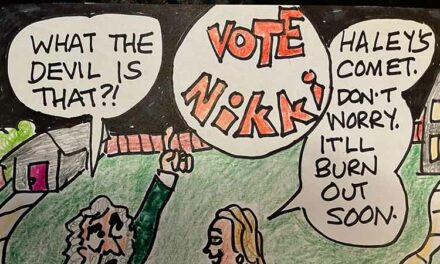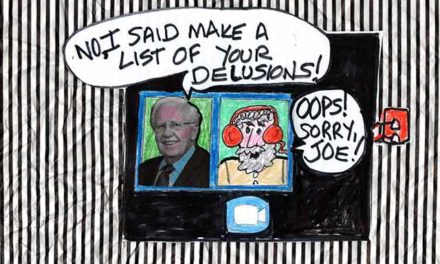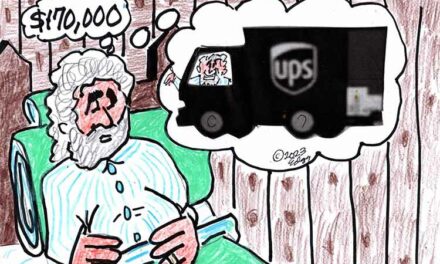A Career-Long Freelance Writer Goes (Pro-)Postal
Neither snow nor rain nor heat nor gloom of Trump stays these couriers
By Ed Goldman
As the election nears—it’s only four weeks and two days away, in case you hadn’t heard; also, Christmas Eve comes out on December 24th this year—I’ve gotten a kick out of reading the testimonials on behalf of, and tirades against the survival of, the U.S. Post Office.
Some of the better suggestions have come, surprisingly, from armchair efficiency experts—the spiritual brothers of sidewalk engineers. These are the people (always guys) who stand on the civilian-side of construction project fences and either shout ideas to the crew or nod knowingly when someone installs rebar to their satisfaction.
They’re also the guys at the end of the bar in a place whose walls feature a display called “Beer Steins of the World,” and whose urinals usually have that day’s sports pages tacked above the tank. These can be used as crib sheets, allowing the reader to return to his barstool not only urologically refreshed but also updated and belligerent-ready for more pints and punditry.
One of the arguments I’ve read in favor of entirely discontinuing postal delivery came from a guy who posted that he did all of his banking online, received his wages via direct deposit and didn’t read magazines, even in electronic formats.
I took this personally—which was shallow of me, since he wasn’t singling me out—and wrote a Facebook reply saying I subscribed to six hard-copy magazines a month and three hard-copy newspapers a day and that if he weren’t such an ill-informed bozo, he’d think of someone besides himself. This was both shallow and stupid of me, for two reasons: first, it’s obvious that all I was doing in my response was thinking of no one besides myself; and second, because I think this guy works as a bouncer at a watering hole of my acquaintance and, because of a misunderstanding there some years ago, knows my home address because he had to give it to a cab driver one night. I’m not sure what the dispute was about but I suspect it wasn’t the post office.
—Ah, I just remembered! I told a guy at the bar I’d stopped going to Sacramento Kings basketball games for the same reason I didn’t re-watch mysteries: I always knew how they were going to end. This seemed to enormously displease the guy, who, as it turned out, was related to DeMarcus Cousins, the famously talented and just as famously irritable then-Sacramento King. I seem to recall asking if he was DeMarcus Cousins’s decousin—and, sometime later, asking a cab driver who’d just revived and dropped me off at my curb if he accepted the Discover card and what he might know about temporarily relocated nostrils. “Well, ya gotta ice,” he said.
But I digress.
Mail delivery has always loomed large in my life because for 50 years I’ve been a freelance writer. I’m sure very few of my colleagues (including me) submit our unsolicited manuscripts to editors by mail anymore. Back then, we were always very careful to include a self-addressed stamped envelope so the bastard editors working for the bastard magazines wouldn’t have to make the effort or incur the cost of actually placing a stamp of their own on an envelope of their own to send us our rejection slips.
We included the envelope so the bastard editors would return our brilliant but misunderstood manuscripts when they rejected them with a little bastard form note that said either ”Sorry, not for us” or if they were really off their feed that day, a personal memo advising, “You might want to look into a career as a doorstop.” O’, what bastards those bastards could be, as I believe Shakespeare wrote about his own editors.
On the other hand, one day in 1981 I returned from a vacation and there was a tiny envelope in the mailbox indicating it had been sent by TV Guide, then the biggest selling magazine in the United States. About two weeks earlier, I’d sent in an unsolicited, lighthearted essay about my having been the first one on my block to buy a video cassette recorder—a majestic, silver monolith that cost more than my television—and that the purchase prompted me to wonder about home video’s new etiquette considerations, such as whether it would be appropriate to yell ”Down in front!” to a member of one’s family.
I grabbed the tiny, thin envelope and said, “Great! The bastard couldn’t even send back my manuscript!” In those days, I still typed my work on an IBM Selectric® typewriter, and many publications indicated they wouldn’t even consider Xerox® or carbon copies of submitted articles (which would have been indicative of the writer’s having scatter-gunned, rather than targeted, his piece).
So, all I was thinking as I tore open the envelope and the little bastard rejection slip flew out was that I’d have to retype the whole thing if I wanted to send it to another publication. Then I picked up the slip from the floor, where it had cruelly wafted its way down, and read it. It was something I rarely saw in those days: a personally typed acceptance note. And at the end of it, a handwritten PS: “Check to follow.”
Had my mail carrier still been on the block, I’d have run out and hugged him or her, figuring if we sometimes want to “kill the messenger” for bringing us bad news, the least we could do would be to embrace him or her when he or she brought us delirious, soul-altering communiqués. (By the way, the expression “Kill the messenger,” which I thought was from Shakespeare, also wasn’t coined by either Mark Twain or Oscar Wilde. The source remains unknown. I only hope he wasn’t killed.)
Finally, the suggestion made by one of the armchair efficiency experts I mentioned in Paragraph 2 was that to save millions of dollars, the USPS simply deliver mail only three days a week, unless a package is special-delivery or containing life-saving contents—such as, I imagine, medical supplies, food or acceptance notes from TV Guide.
Ed Goldman's column appears almost every Monday, Wednesday and Friday. A former daily columnist for the Sacramento Business Journal, as well as monthly columnist for Sacramento Magazine and Comstock’s Business Magazine, he’s the author of five books, two plays and one musical (so far).













